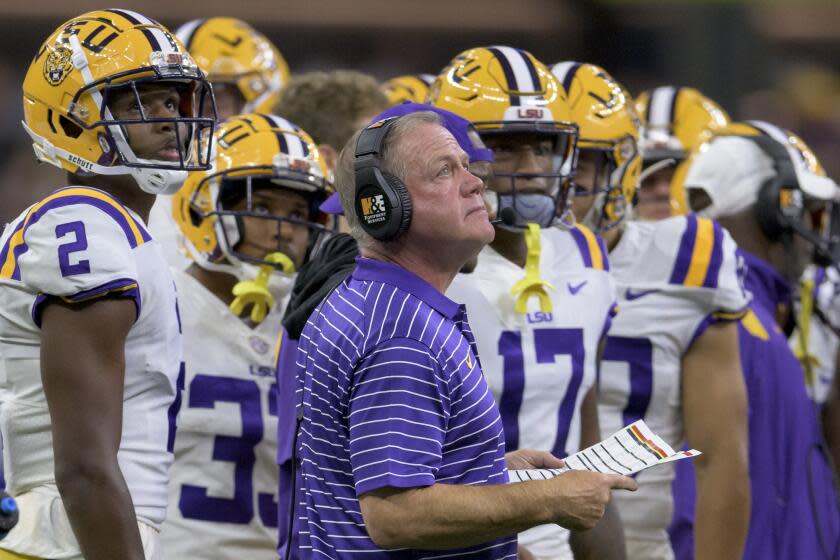Granderson: The NFL is exploiting college football, plain and simple

- Oops!Something went wrong.Please try again later.
For two years, we've witnessed shameful hypocrisy from highly paid coaches underscoring the reality of collegiate football: It’s a taxpayer-funded farm system for the National Football League. It’s about time the NFL stops taking advantage of the public’s love of the game and pays for its own minor league like the NBA and MLB do.
A Supreme Court decision in 2021 put an end to the “amateur” facade of the multibillion-dollar collegiate sports industry by allowing NCAA players to transfer schools and earn money from their likeness. Many college coaches have since bemoaned the effect that student-athletes’ increased agency has on the “culture” now that players can essentially change jobs like them. Take the recent comments of Ole Miss coach Lane Kiffin, who said the shift means “accepting you’re going to not have phenomenal culture.”
“It doesn’t mean I don’t work on it,” he said. “These transfers go to a place that fits them best at that time. It’s not about the school.”
Ole Miss is Kiffin’s fifth school in 11 years.
He’s a public employee making $9 million a year in a state with nearly a 20% poverty rate, the second worst in the country.
Read more: Column: College football's in chaos. It'll still be fun to watch
The poorest state is Louisiana, where in 2021 Louisiana State University signed Brian Kelly to the largest public-school contract in history — 10 years, $95 million. He also gets $500,000 if the university qualifies for a bowl game.
Read more: Oregon State and Washington State file complaint against Pac-12, seek to rebuild conference
Not wins the game, but simply qualifies.
And he had the nerve this spring to fault any player who would transfer “because somebody is offering him more money to go to another school.”
Read more: Column: 15 minutes of fame flies by. Who can help student-athletes cash in?
Between 2002 and 2010, Kelly coached at four schools. His salary increased with each stop.
College football is professional football. These salaries show it. The Supreme Court’s decision about student-athletes confirms it. The top players in the NCAA earn a spot in the NFL.
Read more: Op-Ed: College athletes are cashing in, and it's going better than many feared
So tell me why taxpayers are funding this system rather than the NFL?
Sure, back in 1869, when the game first became part of the fabric of the college experience, it was about the school. But since broadcasting deals got involved, it’s been about the money. And college football has morphed into a minor league system for the NFL.
In 2019, there were four head coaches in the college football playoffs who combined made about four times as much as all 50 governors. The championship game between Alabama and Clemson (South Carolina) featured two states that have historically been among our poorest and least educated. It also featured two schools that combined have nearly 100 alumni on current NFL rosters. Nick Saban and Dabo Swinney, the coaches in that championship game, are well known for preparing players for the NFL. And to no one’s surprise, they have also been among the biggest critics of the Supreme Court ruling. LSU and Ole Miss have 66 former players who now play on Sundays.
Read more: How the Pac-12 became the Pac-2
However, unlike the NBA’s G League or MLB’s triple A, the NFL isn’t paying out of pocket to develop raw talent over the course of years. And when the states are as poor as Alabama, well, that just feels wrong. Especially when you factor in the salaries of assistant coaches, some of whom also make more than governors do.
It’s not the hypocrisy of high-priced coaches that offends me most, but the exploitation by the richest league in the nation. The NFL is gaming a system that hurts the poorest among us. If Kiffin wants college football to be about the school again, that has to start with the NFL creating its own farm system. Any high school football player who wants to can begin his pro training in earnest the way it’s done in the NHL. It’s not a perfect solution, but it builds toward a more equitable one.
This story originally appeared in Los Angeles Times.

